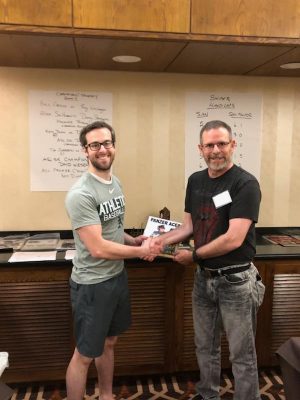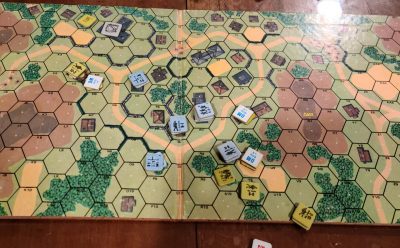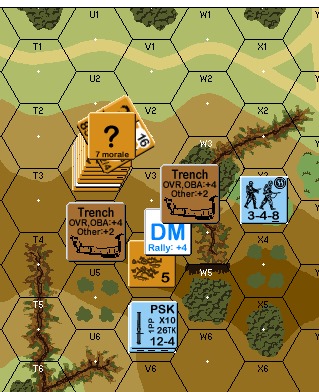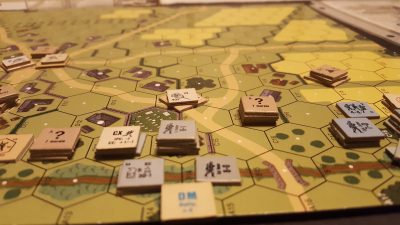Games that create memories are what we as wargamers strive for. Such games capture the imagination and immerse the player in the game. No longer are the players sitting by a table at home, but rather their imaginations have taken them to some far away battle! For my money, no other game captures the imagination like Advanced Squad Leader. This game, first released in 1985 by the now-defunct Avalon Hill (but perpetuated by Multiman Publications), is a tactical wargame of the hex-and-counter variety. The battles are primarily from the Second World War; however, it has since expanded to include the Korean War. Each player manoeuvres his squads, crews and AFVs and guns across generic and historical battlefields in games that can last anywhere from 30 minutes to several hours or even days. Practically every game will end up with a narrative that will leave an indelible mark in the memories of the players involved. Allow me to illustrate.
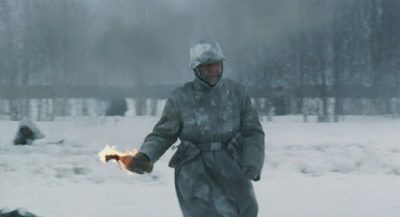 |
| I foresee no negative outcome to my decision to use fire |
The date was 14 September, 1942, and as the German battalion commander, Captain Gerhard Muench, I was leading an initial attack in Stalingrad in the historical scenario "In Sight of the Volga". The simulated battle was noteworthy for several reasons. My opponent, Will, ended up being reluctant to try for his Molotov Cocktails (A 22.6).
The reason? He rolled 6 on his colored die in his attacks, voiding his attack, breaking his attackers and to add insult to injury, placing a flame in his location! This must have happened 3 times. On his fourth possible attempt, he declined to even try!
Poor Will! Alas, I haven't even gotten to the best part yet! To win the game, I had to occupy a building that had in them a series of fortified locations. I had pushed past this building to an assault position and then planned to hit its flank. I couldn't just move up to the building (under the cover of fire, of course) and enter. You see, with a fortified location, the only way to enter is if the force was less than a squad equivalent, was pinned or otherwise not in good order. Fortunately (for me), I had plenty of firepower, mainly in the form of two STuG III G Assault Guns. In addition, not only were some of my men Assault Engineers, but they brought with them some Demolition Charges (DC). Without getting into too many details, this meant that they could place smoke rather easily and they could breach into the fortified location without having to pin or break the occupants.
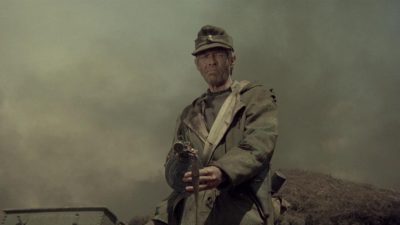 |
| Don't you know that you're my hero? |
So my attack was set. I had a firebase isolating the objective. I brought forward a squad of Assault Engineers, placed infantry smoke and then used assault move to get up to the building. So far, so good. Now to place the DC. Now, Will wasn't born yesterday and he had anticipated this move. His defensive first fire was effective and caused my squad to undergo a morale check. With a morale level of 8, I felt confident that I would pass. As the dice settled, they indicated 1, 1. Snake eyes! This invoked heat of battle and a subsequent Dice Roll (DR). The result couldn't have been better for me! My roll resulted in both hero creation and battle hardening! Now my squad was fanatic and a single man counter in the form of a hero was added to the hex.
Of course, I gave the DC to the hero! The attack was successful, I had created a breach and I then advanced into the location and entered into close combat with the hapless enemy! Even though it was an NKVD Strongpoint, I had the upper hand. I ended up rolling for ambush and eliminated the defenders. It was the beginning of the end for Will's defense, though it still had a ways to go and he ended up successfully using a Molotov Cocktail on one of my STuG III Gs, destroying it.
How does ASL do this? How do such narratives come out of a simple game using dice and cardboard counters? I've played many wargames, from the tactical to the strategic level and no other captures the imagination quite the same way as ASL does. In my opinion, it is due to the many random events that the game generates. I have already mentioned one, heat of battle. Although there are some exceptions, this is invoked following any original 2 on a morale check or rally DR. The results can be very good or very bad. The results include the previously mentioned hero creation and battle hardening. Other results include berserk and even surrender. There are modifiers to the roll following heat of battle, but suffice it to say that Russians and Japanese are more prone to go berserk than other nations.
Another random event is field promotion. This can create a leader in one of two ways. If you roll an original 2 on a MMC Self-Rally or on amy MMC CC DR, that player will then make a die roll (dr) and generate a leader immediately. As with all things ASL, there are exceptions, for example, field promotion is NA to both Japanese and Finns. A less common random event is the wind change die roll at the start of all player rally phases. An original 2 or 12 will result in possible wind changes, gusts, and the like. This may not sound significant, but consider that well-laid smoke screen suddenly being blown away by a gust of wind just as your forces are in the middle of the enemy's killing zone! (Yes, it has happened to me!)
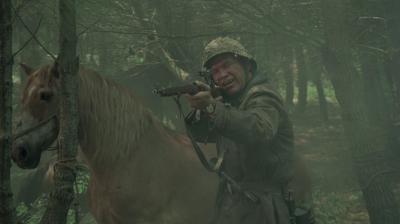 |
| So, you thought you were going to win pretty easily, didn't you? |
The most common random event is the sniper activation.
In every ASL scenario, snipers are inherent. Both sides will have a Sniper Activation Number (SAN), which, if rolled in certain phases by your opponent, may trigger (pun intended) a sniper attack. Such an attack may eliminate or wound a leader. If this happens, especially if the leader dies outright or due to wound severity, then any troops with him will immediately undergo a leader-loss morale check LLMC). Each morale check could invoke another SAN or Heat of Battle! All from one DR that ends up causing a major swing in a game. And yes, it happened to me! I had a 9-2 leader with some squads when they were hit by a SAN. Random Selection ended up killing my leader. The squads with him, who were busy manning some machine guns, all failed the LLMC and ending up routing to cover and didn't really contribute much to the battle afterwards. I ended up winning the game in the end; however, losing that leader was critical and it ended up being a much-closer affair thanks to that one attack.
"Advanced Squad Leader" is a complex game with a very comprehensive rule set. That said, not only are the possibilities for scenarios more than one could possibly play in a single life time (By my count, there are 694 officially released scenarios and 7,858 third-party scenarios, most of which are of top-quality). The player who uses his forces wisely, by attacking the enemy weakness and avoiding his strength, will more often than not win. That said, the greatest enjoyment, for me, comes from the rich narrative that the game creates. They are a result of the various random events, only some of which are mentioned above. There is also interrogation and of course one may have to watch out for booby traps and nighttime can cause forces to jitter fire. But don't worry, players, even if you lose, you'll remember the background story that your game will create!
